In the series of its London lectures, the Centre for the Study of Islamic Manuscripts at Al-Furqān organised a public lecture, on Wednesday 5th April 2017, at its headquarters, titled “Vestiges of Dissolved Libraries: Tracing Damascene Manuscripts”, delivered by Prof. Konrad Hirschler.
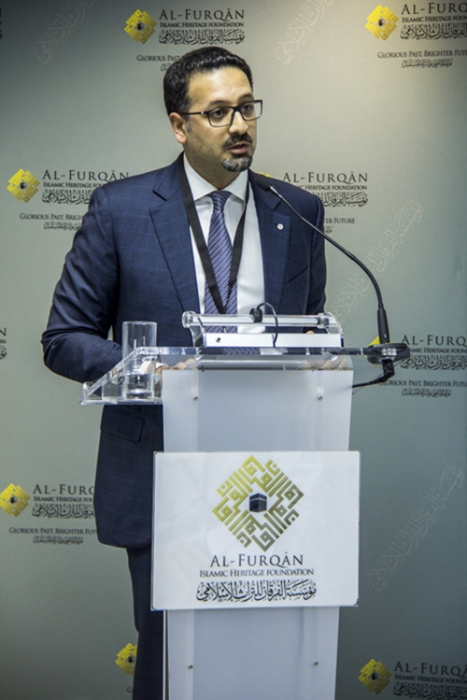
The event was opened by Mr Sharaf Yamani, Member of the Board of Directors of Al-Furqān, who welcomed the guests and announced that this year, Al-Furqan will dedicate some of its activities to shedding light on the fate of human heritage in Syria. As a result of the ongoing war, part of this heritage has been destroyed and the remaining part is endangered. He commented that this lecture comes within Al-Furqan’s scope, in raising awareness about this shared heritage, in order to identify the challenges and call upon the relevant institutions to preserve and protect such treasures, be it manuscripts or other artefacts; consequently, identifying the provenance of manuscripts in the years to come, in order to prevent their dispersal. He also pointed out that there will be other activities during this year, which will discuss different aspects of this heritage.
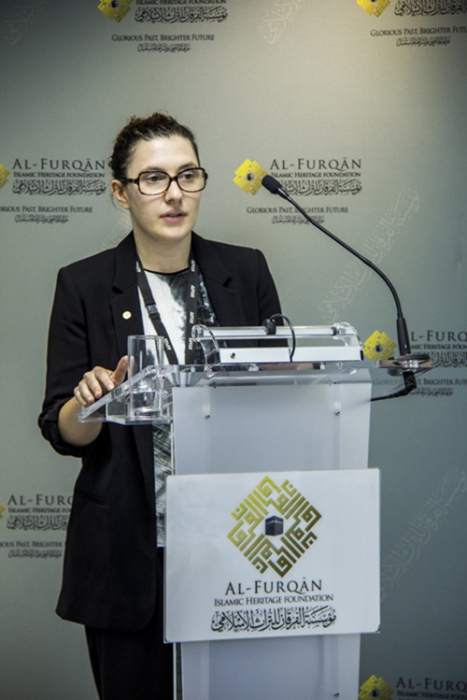
The lecture and the lecturer were introduced by Ms Celeste Gianni, Library Assistant at Al-Furqān Islamic Heritage Foundation.
The keynote speaker, Professor Konrad Hirschler, began his lecture by thanking those institutions - in particular Al-Furqān Islamic Heritage Foundation – that work for the preservation and promotion of the Islamic written heritage and provide researchers with invaluable reference works and primary sources for their work.
Prof. Hirschler then focused on the rich manuscript and library culture of Damascus up to the 20th century. He mentioned that, starting with the 13th century, endowed libraries emerged on a significant level in the Middle East and thus the city of Damascus. Today, none of these libraries has survived. Hence, the main evidence for their history are extant manuscripts. Manuscript notes sometimes explicitly link a manuscript to one or more libraries in which it was held over the last few centuries. However, in most cases this evidence is incomplete or entirely absent and has to be supplemented with information from additional sources.
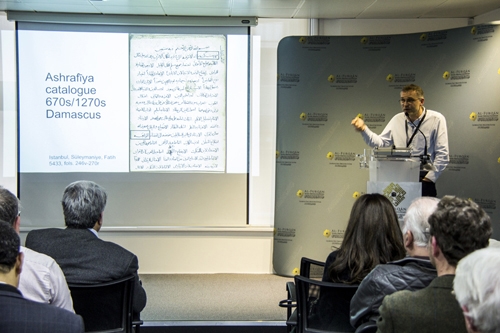
Prof. Hirschler proposed a methodology for tracing manuscript movements, by discussing, as a case study, the library of theʿUmarīya Madrasa on the slope of the Qāsyūn mountain to the west of Damascus’ Old City. This library was a major institution within the scholarly landscape of Damascus, with thousands of manuscripts. Yet this library was dissolved in the late 19th century and no catalogue of its stock has survived. Even before its dissolution, numerous manuscripts were taken out of the library and sold on the city’s book markets.
Prof. Hirschler discussed ways to identify the trajectories of formerʿUmarīya manuscripts, which are today held in libraries such as Damascus, Cairo, Istanbul, Paris, Princeton and Berlin, by looking closely at the manuscript notes such as ownership statements (tamalluk), endowment statements (waqf), transmission certificates (ijāzah), seals, and other documentary notes. He suggested that this methodology could be applied to other libraries, in order to retrace the movement of their manuscripts.
Furthermore, he provided possible approaches for future research on the provenance of manuscripts, as this will be a major task in the years to come, in order to prevent their dispersal, especially, taking into consideration the current war in Syria, where, cultural artefacts - including manuscripts - have been damaged or are in danger of being taken out of their pre-war location.
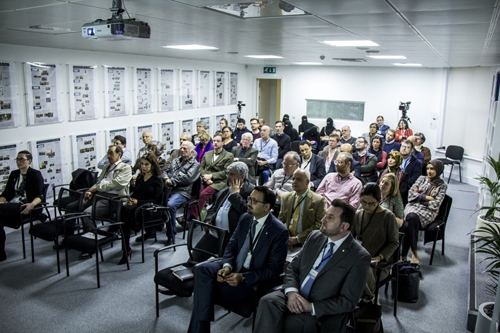
The lecture was followed by numerous questions from the engaged audience regarding various aspects covered by Prof. Hirschler.
Konrad Hirschler has been Professor of Islamic Studies at the Freie Universität Berlin since 2016 and was previously Professor of Middle Eastern History at SOAS (University of London). His research focuses on Egypt and Syria in the Ayyubid and Mamluk periods (c. 1200-1500) with a focus on social and cultural history. Over the last few years, he has primarily worked on the history of reading, of the book and of libraries in the Syrian lands. Currently, his main project is concerned with the materiality of Arabic manuscript cultures. This includes the digital reconstruction of Damascene legal documents during the Mamluk period. Scribes regularly cut such documents into pieces to produce new manuscripts. Research on such reuse practices allows entirely new insights into legal practices and manuscript cultures.
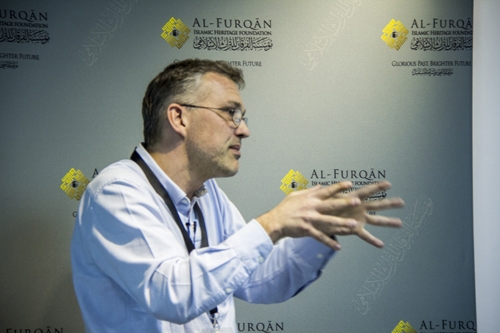
Konrad Hirschler is the author of Medieval Damascus: Plurality and Diversity in an Arabic Library (2016; funded by the British Academy), The Written Word in the Medieval Arabic Lands: A Social and Cultural History of Reading Practices (2012; awarded the BRISMES Book Prize, currently translated into Italian) and Medieval Arabic Historiography: Authors as Actors (2006; awarded the Leigh Douglas Memorial Prize for best doctoral dissertation on Middle Eastern topic). Among his co-edited volumes are Alliances and Treaties between Frankish and Muslim Rulers in the Middle East (2013) and Manuscript Notes as Documentary Sources (2011).
Related Video

